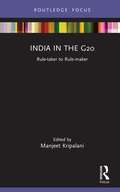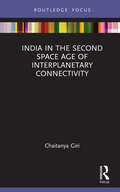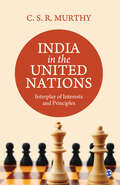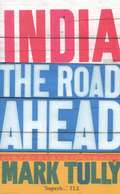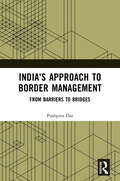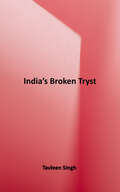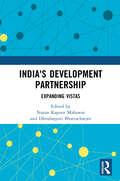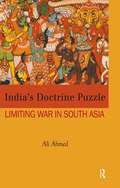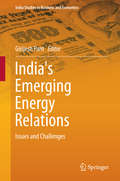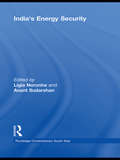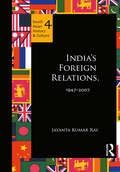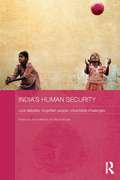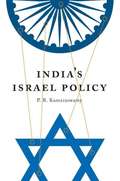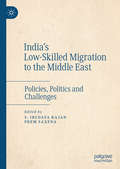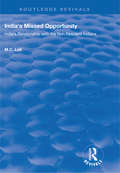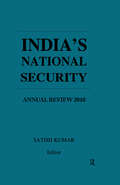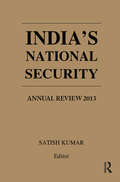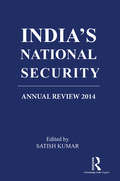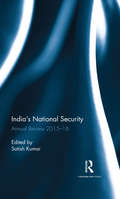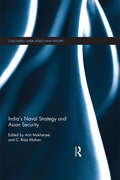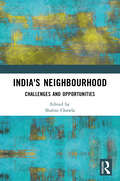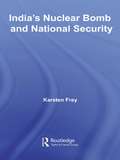- Table View
- List View
India in the G20: Rule-taker to Rule-maker (The Gateway House Guide to India in the 2020s)
by Manjeet KripalaniThis book analyses the importance of the G20 to India, its role so far, and how it can leverage its presidency year to be an influential author of new global rules. In 2023, India will be the President of the G20 Summit, the world’s most influential multilateral economic forum. For countries like India, the G20 is a unique global institution, where developed and developing countries have equal stature. This creates opportunities to showcase their global political, economic and intellectual leadership, have a significant impact on the global economic governance agenda and make it more inclusive. This volume discusses how the Presidency year gives India the opportunity to ‘… hold the pen, write the rules’ and lead the G20 year intellectually, financially, managerially and administratively. It provides a ringside view of India’s path to the G20 Presidency and examines issues such as the core agenda of the G20; explains the significance of forums like T20, B20, and their proliferations; India’s journey as a marginal player in the G20 to its current status; issue of dedicated leadership and management; and India’s Agenda for 2023. Topical, timely, important and lucidly written, this book in The Gateway House Guide to India in the 2020s series will be key reading for scholars and researchers of economics, multilaterals, global governance, strategic studies, defence studies, SAARC, UN Studies, foreign policy, international relations, international economics and international trade, as well as interest to policymakers, diplomats, career bureaucrats, and professionals working with think tanks, academia and multilateral agencies, and business.
India in the Second Space Age of Interplanetary Connectivity (The Gateway House Guide to India in the 2020s)
by Chaitanya GiriThis volume discusses the emergence of space exploration as a new pivot of the global space economy in the decade of 2020s. Space exploration and human spaceflight will soon become vital strategic initiatives in the imminent second space age, evolving from scientific pursuits to mega-economic projects. As the scope of international cooperation in space forays into soft science diplomacy, the second space age opens opportunities for India to mount its space program as an ambitious yet conscientious, proficient, and cordial player in the global space economy. This book, — Explores imminent trends in space exploration and interplanetary connectivity plans, their returns to the global economy of the future, and impact on the global astropolitical order; — Analyses the techno-economic significance of India’s space exploration by reviewing the legal, ethical and philosophical challenges; the limits of global space exploration policies; and the economic lacunae for the astropolitical gains; — Examines the transformational trio of Chandrayaan, Mangalyaan and Gaganyaan; dawn of the second space age; interplanetary connectivity projects; besides discussing the viability of humans becoming an interplanetary species. Part of The Gateway House Guide to India in the 2020s series, this topical volume will be useful for scholars and researchers of international relations, geopolitics, foreign policy, space policy, South Asian studies, strategic studies, and international trade.
India in the United Nations: Interplay of Interests and Principles
by C.S.R. MurthyIndia in the United Nations: Interplay of Interests and Principles presents a holistic and systematic understanding of India’s long and rich association with the United Nations (UN) ever since it was established nearly 75 years ago. It examines notable patterns and phases of India’s role in the UN and focuses on key areas of contemporary relevance where India’s diplomatic efforts were at play. These include the India–Pakistan conflicts as well as other regional conflicts in the context of new threats to security, peacekeeping operations, countering international terrorism, protection of human rights, development diplomacy, internet governance and the question of enlargement of the Security Council. This book offers glimpses of India’s persistence in framing its priorities and strategies for securing moral, legal and political endorsement in line with the established principles of the UN. The insights from these cumulative experiences of the present and previous governments are pertinent to crafting India’s future global role.
India in the World Economy
by Tirthankar RoyCross-cultural exchange has characterised the economic life of India since antiquity. Its long coastline has afforded convenient access to Asia and Africa, and trading partnerships formed in the exchange of commodities ranging from textiles to military technology. In a journey spanning 2,000 years, this book describes the ties of trade, migration and investment between India and the rest of the world, showing how changing patterns of globalisation reverberated on economic policy, politics, and political ideology within India. Through his narrative, Doctor Tirthankar asks three major questions: Is this a particularly Indian story? When did the big turning points happen? Is it possible to distinguish the modern from the pre-modern pattern of exchange? These questions invite a new approach to the study of Indian history by placing the region squarely at the centre of the narrative. This is global history written on India's terms, inviting South Asian, Indian and global historians to rethink both their history and their methodologies.
India of My Dreams
by M. K. GandhiIt is a happy idea to place before the world and the country at the present moment when we are entering upon a new era a picture of the India of Mahatma Gandhi’s dreams. The freedom which we have won is throwing upon us the responsibilities of making or marring the future of India. It is in no small measure the achievement of Mahatma Gandhi’s leadership. The matchless weapon of truth and non-violence which he has used is needed by the world to cure it of many of its ills. In our hour of victory and rejoicings we cannot afford to ignore either the leader who has led us or the undying principles which have inspired him. Freedom is only the means to a greater and nobler end, and the achievement of India of Mahatma Gandhi’s dreams will be the fitting consummation of all that he has worked for and stands for. A book, which places before the reader not only those basic and fundamental principles, but also indicates how we can help to fulfil them through our freedom by establishing a polity and social life, and through the instrumentality of a constitution and the dedication of the human material which this vast country will now throw up to work without any external fetters or internal inhibitions. — Rajendra Prasad
India the Road Ahead
by Mark TullyFull of fascinating stories of real people at a time of great change, it will be of interest to economists, business people, diplomats, politicians, as well as to those who love to travel and who take an interest in the rapid growth of one of the world's largest countries, and what this means to us in the West.
India's Approach to Border Management: From Barriers to Bridges
by Pushpita DasThis book attempts to provide a comprehensive understanding of the circumstances which have shaped India’s approach towards its international borders and the framework it has developed to better manage its borders. The book argues that persistence of various cross-border threats and challenges and an absence of robust intra-regional trade among its neighbouring countries forced India to employ a security-centric and unilateral approach to border management with emphasis on hardening the borders to cross-border trade and travel and keeping the border areas underdeveloped to act as a buffer against external conventional threats. Besides discussing the threats and challenges that India faces along the borders, the book aims to develop an understanding of India’s border management practices by analysing various programmes and initiatives such as the raising of border guarding forces; building of physical and electronic fences; the establishment of modern facilities for smoothening legitimate cross-border travel; the development of the border areas through special programmes; and increasing trade and connectivity as well as other cooperative bilateral mechanisms. Print edition not for sale in South Asia (India, Sri Lanka, Nepal, Bangladesh, Pakistan and Bhutan).
India's Broken Tryst
by Tavleen SinghSeventy years after Nehru’s beautiful midnight speech – ‘Long years ago we made a tryst with destiny…’ – in Indian cities and villages millions survive on less than the bare minimum. Children are not in classrooms, women have nowhere safe to relieve themselves, and jobless men lie around in a daze. In cities, where initiative should flourish, a merciless state looms large over every common endeavour. The civilization that was India, that grand culture, has not found utterance again. Long years after freedom from the British, why do we remain suppressed? In India’s Broken Tryst, bestselling author and popular political columnist Tavleen Singh chronicles the damage done. Here is the story of Surekha, who lives on the pavements of Mumbai’s landmark Marine Drive with memories of crushing hunger. Of Ali, the idli seller who is forced out of his honest livelihood by cops and corporators. Of Sahib and Sardar, little boys torn from their mother on the criminal charge of begging. Of those nameless servants who do not have access to toilets even as they service the luxury apartments where Singh lives. From the very poor to the very rich, Tavleen Singh catalogues in bold, eviscerating detail the systematic unmaking of our sense of destiny. Can an Indian dream stretch beyond food and water, literacy, toilets, and in some cases just a document of identification? If not, what destiny?
India's Development Partnership: Expanding Vistas
by Nutan Kapoor Mahawar Dhrubajyoti BhattacharjeeIndia's foreign policy is based on the principle of "Vasudhaiva Kutumbakam"—the world is one family. Despite resource constraints, India shares its developmental experience and technical expertise with other developing countries as part of its commitment to South-South cooperation. India's development partnership is a mutually beneficial human-centric model based on trust, respect, sovereignty, transparency, and collaboration. This edited volume compiles views and papers presented at a seminar on India's Development Partnership, marking ten years of the Development Partnership Administration.Print edition not for sale in South Asia (India, Sri Lanka, Nepal, Bangladesh, Pakistan and Bhutan)
India's Doctrine Puzzle: Limiting War in South Asia
by Ali AhmedThe balance of power in South Asia is tenuous. Neighbouring states with nuclear arsenal pose a serious threat in times of conflict and the danger of escalation into a nuclear holocaust in South are ever-present. This book locates the change in India’s war doctrine at the turn of the century, following the Kargil War in 1999 between India and Pakistan. It examines how war policy was shaped by the threat posed by India’s neighbours and the need for greater strategic assertion. It also reveals that this change was forced by the military’s need to adapt itself to the nuclear age. Finally, it raises questions of whether the Limited War doctrine has made India more secure. An astute analysis of not only India’s military strategy but also of military doctrine in general, this book will be valuable to scholars and researchers of defence and strategic studies, international relations, peace and conflict studies, South Asia studies as well as government and military institutions.
India's Emerging Energy Relations
by Girijesh PantThis book analyzes the role of energy in Indian foreign policy, particularly in defining bilateral relations. It also focuses on the critical gaps in conceptualizing its formulations and recommends a framework for sustainable energy security. India, the fourth largest consumer of oil, is an energy-deficit economy, importing more than eighty percent of its needs. This makes securing energy integral to its foreign policy goals. Obviously it is important for India to actively participate in the global energy market and establish robust, enduring and nuanced diplomatic relations with energy exporting countries. Equally important is that India diversifies its energy mix and moves towards carbon-free growth. Renewable energy is today high on the global energy agenda. Indian energy policy thus has to address a range of issues, domestically and on foreign turf. It has to move beyond the transactional mode by creating equity in the global energy industry. Today, the global energy regime is undergoing fundamental changes, as is the power dynamics of the global energy order. There are now many new producers and diverse consumers. The trade in energy has increased in volume and its direction has shifted from the West to the East, and the ongoing structural changes in the energy market call for a new security architecture. Given the complex and competitive environment of the new geo-economics and geopolitics of energy, the question could well be, should India frame energy issues in conflict mode or move toward innovative cooperation? In either case the message is that India needs an integrated energy security policy.
India's Energy Security (Routledge Contemporary South Asia Series)
by Ligia Noronha Anant SudarshanThis book explores the multifaceted aspects of India’s energy security concerns. Bringing together a set of opinions and analysis from experts and policymakers, it sheds light on the context of India’s energy insecurity and explores its various dimensions, its nature and extent. Contributors examine the role that trade, foreign and security policy should play in enhancing India’s energy security. It is argued that the key challenge for India is to increase economic growth while at the same time keeping energy demands low. This is especially challenging with the transition from biomass to fossil fuels, the growth of motorized private transport, and rising incomes, aspirations and changing lifestyles. The book suggests that at this time there are strong arguments to lessen the fossil fuel path dependence and it argues for a need to engage with all the key sources of this dependence to implement a process of energy change. India’s Energy Security is a timely contribution given the national and international interest in the issue of energy security and the possibility that energy concerns have the potential of becoming the cause of serious international conflicts. It will be of interest to academics and policy makers working in the field of Asian Studies, Energy Policy, International Relations and Security Studies.
India's Foreign Relations, 1947-2007: India's Foreign Relations, 1947-2007 (South Asian History and Culture)
by Jayanta Kumar RayThis book analyses India’s relations with its neighbours (China, Pakistan, Bangladesh, Sri Lanka) and other world powers (USA, UK, and Russia) over a span of 60 years. It traces the roots of independent India’s foreign policy from the Partition and its fallout, its nascent years under Nehru, and non-alignment to the influence of economic liberalization and globalization. The volume delves into the underlying reasons of persistent problems confronting India’s foreign policy-makers, as well as foreign-policy interface with defence and domestic policies. This book will be indispensable to students, scholars and teachers of South Asian studies, international relations, political science, and modern Indian history.
India's Human Security: Lost Debates, Forgotten People, Intractable Challenges (Routledge Studies in South Asian Politics)
by Åshild Kolås Jason MiklianIndia's explosive economic growth and emerging power status make it a key country of interest for policymakers, researchers and scholars within South Asia and around the world. But while many of India's threats and conflicts are strategized and discussed extensively within the confines of security studies, strategic studies and conventional international relations perspectives, many less visible challenges are set to impact significantly on India's potential for economic growth as well as the human security and livelihoods of hundreds of millions of Indian citizens. Drawing on extensive research within India, this book looks at some of the ‘hidden risks’ that India faces, exploring how a broadened scope of what constitutes ‘risk’ itself holds value for Indian security studies practitioners and policymakers. It highlights several human security risks facing India, including the inability of the world’s largest democracy to deal effectively with widespread poverty and health issues, resource depletion and environmental mismanagement, pervasive corruption and institutionalized crime, communal violence, a protracted Maoist insurgency, and deadlocked peace processes in the Northeast among others. The book extracts common themes from these seemingly disparate problems, discussing what underlying failures allow them to persist and why policymakers heavily securitize some political issues while ignoring others. Providing an understanding of how several lesser-studied risks can pose potential or actual threats to Indian society and its ‘emerging power’ growth narrative, this book is a useful contribution to South Asian Studies, International Security Studies and Global Politics.
India's Israel Policy
by P. R. KumaraswamyIndia's foreign policy toward Israel is a subject of deep dispute. Throughout the twentieth century arguments have raged over the Palestinian problem and the future of bilateral relations. Yet no text comprehensively looks at the attitudes and policies of India toward Israel, especially their development in conjunction with history. P. R. Kumaraswamy is the first to account for India's Israel policy, revealing surprising inconsistencies in positions taken by the country's leaders, such as Mahatma Gandhi and Jawaharlal Nehru, and tracing the crackling tensions between its professed values and realpolitik. Kumaraswamy's findings debunk the belief that India possesses a homogenous policy toward the Middle East. In fact, since the early days of independence, many within India have supported and pursued relations with Israel. Using material derived from archives in both India and Israel, Kumaraswamy investigates the factors that have hindered relations between these two countries despite their numerous commonalities. He also considers how India destabilized relations, the actions that were necessary for normalization to occur, and the directions bilateral relations may take in the future. In his most provocative argument, Kumaraswamy underscores the disproportionate affect of anticolonial sentiments and the Muslim minority on shaping Indian policy.
India's Israel Policy
by P. R. KumaraswamyIndia's foreign policy toward Israel is a subject of deep dispute. Throughout the twentieth century arguments have raged over the Palestinian problem and the future of bilateral relations. Yet no text comprehensively looks at the attitudes and policies of India toward Israel, especially their development in conjunction with history.P. R. Kumaraswamy is the first to account for India's Israel policy, revealing surprising inconsistencies in positions taken by the country's leaders, such as Mahatma Gandhi and Jawaharlal Nehru, and tracing the crackling tensions between its professed values and realpolitik. Kumaraswamy's findings debunk the belief that India possesses a homogenous policy toward the Middle East. In fact, since the early days of independence, many within India have supported and pursued relations with Israel. Using material derived from archives in both India and Israel, Kumaraswamy investigates the factors that have hindered relations between these two countries despite their numerous commonalities. He also considers how India destabilized relations, the actions that were necessary for normalization to occur, and the directions bilateral relations may take in the future. In his most provocative argument, Kumaraswamy underscores the disproportionate affect of anticolonial sentiments and the Muslim minority on shaping Indian policy.
India's Low-Skilled Migration to the Middle East: Policies, Politics and Challenges
by S. Irudaya Rajan Prem SaxenaThis book provides new insights and research studies on how developing countries come to terms with the nationalisation policies of Gulf economies that provide employment for their nationals. Focusing on regions and countries that have traditionally been overlooked, it includes studies on labour migration from Egypt to the Middle East and from the Philippines to Lebanon, migrant experiences and policy prospects in Saudi Arabia and Lebanon, and Indian migration to the Gulf. The book fills a critical gap in migration research by studying migration from various Indian states, such as Tamil Nadu, Telugu-speaking states (Telangana and Andhra Pradesh), Rajasthan and Uttar Pradesh. It also explores the unexpected phenomenon of demographic windows of economic opportunity (not documented in demographic literature) observed in a few Arab countries due to older migrant expatriates returning to their home country; the impact of international out-migration on intergenerational educational mobility among children in migrant-sending households in Kerala; and forced migration of Kerala Muslims to the Gulf.
India's Missed Opportunity: India's Relationship with the Non Resident Indians (Routledge Revivals)
by Marie C. LallThis title was first published in 2001. An important analysis of the links between the Indian Diaspora and the state and how this Diaspora can influence economic and foreign policy making in their country of origin. M.C. Lall focuses on India, presenting an unusual case whereby the Indian government in post- independence years ostracized its Diaspora despite the need for outside help with India’s economic development. This in-depth study of the failure of the Indian government to make good use of its Diaspora looks at the reasons why India did not cultivate a relationship after independence; why there was still no change even in light of its economic liberalization and what have been the consequences of this missing relationship.
India's National Security: Annual Review 2010
by Satish KumarThis book gives readers an in-depth and up-to-date account of India’s external and internal threats in a deteriorating global security environment. It shows that while partnerships with some countries have strengthened, anxieties persist with others such as China and Pakistan. Similarly, India has not been able to cope with the challenges of internal security emerging from violence in Kashmir, insurgency in the north-east, to mention a few. Problems of global terrorism and global warming stare us in the face. Tensions between major powers, threats and counter-threats between major and middle powers, and international hotspots like Georgia and Afghanistan remind us that there is intense competition for strategic space. India as an upcoming power is treading its path carefully and is developing meaningful partnerships with all major powers. China’s reluctance to proceed further in resolving the boundary dispute with India, its reported incursions on the borders and its rapid military modernisation has caused anxiety in India. India is nevertheless upgrading its military capability to meet any Chinese threat. Pakistan’s lack of adequate action in punishing those responsible for the 26/11 Mumbai terrorist attack and its reluctance to destroy the infrastructure of terrorism in Pakistan has put a question mark on the future of India Pakistan relations. These and various other threats and challenges are discussed in this volume, latest in a unique series with contributions from academics, political commentators and military personnel.
India's National Security: Annual Review 2013
by Satish KumarIndia’s National Security: Annual Review 2013 comprehensively analyses India’s engagement with major world powers, and immediate neighbours in a complex global security environment. It examines India’s response to internal and external threats, its foreign policy as well as measures taken for strengthening its economic security.
India's National Security: Annual Review 2014
by Satish KumarThis fourteenth volume of India’s National Security Annual Review intensively analyses India’s national security with respect to the changing internal and external dynamics. In the global environment, the situation is characterised by rising tensions between United States and Russia, intensified rivalry between United States (US) and China, and increasing cooperation between China and Russia. For India which seeks peaceful growth to emerge as a major power, this poses severe diplomatic challenges. This volume discusses the complexity of these challenges and the deftness with which India gets the best out of its strategic partnerships with the US and Russia while warding off the transgressions of a mighty adversary like China. It also studies the impact of internal convulsions and external intrusions on India’s security from South Asian nations such as Afghanistan, Bangladesh, Nepal and Sri Lanka. Examining the field of internal security, the essays carry rare insights into the causes of expansion of Naxalite violence in tribal areas and the dynamics of conflict resolution in the Northeast, as well as India’s deep concern as a growing power with its economic slowdown in the recent past, and energy and cyber security. Bringing together contributions from eminent scholars and diplomats, the volume will be indispensable for policymakers, government think tanks, defence and strategic studies experts, as well as students and researchers of international relations, foreign policy and political science.
India's National Security: Annual Review 2015–16
by Satish KumarThe last two years have witnessed deterioration in the global security situation characterised by increasing tensions among major powers. The threat perceptions of the US, China and Russia vis-à-vis each other have sharpened. There is stiff competition among them to dominate the strategic space in different parts of the world. This has led them to formulate national security strategies which are more assertive, aggressive and competitive. There is lack of consensus in resolution of conflicts in Afghanistan and Syria. There is no concerted effort in meeting the challenge of the Islamic State. It is in this fractured security environment that India has been making special efforts to project itself as a leading power commensurate with its economic and military potential. This fifteenth volume of India’s National Security Annual Review undertakes an incisive analysis of India’s endeavours to maximise its gains with respect to its strategic partners. The volume also focuses on the new dynamism that India has injected in its relations with countries in the Middle East and the Asia Pacific. India’s threat perceptions in its extended security zone, critical aspects of its strategic preparedness and complex issues regarding its internal security have been thoroughly examined. With contributions from experts from the fields of diplomacy, academia and civil and military services, the book will be one of the most dependable sources of analyses for scholars of international relations, foreign policy, defence and strategic studies, and political science, and practitioners alike.
India's Naval Strategy and Asian Security (Cass Series: Naval Policy and History)
by C. Raja Mohan Anit MukherjeeThis book examines India’s naval strategy within the context of Asian regional security. Amidst the intensifying geopolitical contestation in the waters of Asia, this book investigates the growing strategic salience of the Indian Navy. Delhi’s expanding economic and military strength has generated a widespread debate on India’s prospects for shaping the balance of power in Asia. This volume provides much needed texture to the abstract debate on India’s rise by focusing on the changing nature of India’s maritime orientation, the recent evolution of its naval strategy, and its emerging defence diplomacy. In tracing the drift of the Navy from the margins of Delhi’s national security consciousness to a central position, analysing the tension between its maritime possibilities and the continentalist mind set, and in examining the gap between the growing external demands for its security contributions and internal ambivalence, this volume offers rare insights into India’s strategic direction at a critical moment in the nation’s evolution. By examining the internal and external dimensions of the Indian naval future, both of which are in dynamic flux, the essays here help a deeper understanding of India’s changing international possibilities and its impact on Asian and global security. This book will be of much interest to students of naval strategy, Asian politics, security studies and IR, in general.
India's Neighbourhood: Challenges and Opportunities
by Shalini ChawlaIndia’s neighbourhood has witnessed crucial developments in the last decade: complex security challenges, looming economic crises, socio-political unrest, border clashes, China’s expanding engagement, India’s rising profile, and the COVID-19 pandemic. Over the last eight years, India has advocated the “Neighbourhood First” policy which ‘focuses on creating mutually beneficial, people-oriented, regional frameworks for stability and prosperity’. India’s neighbourhood presents complex dynamics, and the challenges demand attention and serious consideration in its policy options. The versatile neighbourhood also offers opportunities for India to extend cooperation at the regional level and address common strategic, economic, social and security concerns. India’s Neighbourhood: Challenges and Opportunities with insights of leading experts is a timely contribution to academia, practitioners, and keen readers. The book fills a critical void in the domain of neighbourhood studies and comprehensively analyses India’s bilateral relations with Afghanistan, Bangladesh, Bhutan, China, Iran, the Maldives, Myanmar, Nepal, Pakistan, and Sri Lanka. The book assesses the traditional security challenges like terrorism, examines crucial non-traditional security issues (hydro-politics and climate change), scans the emerging dynamics of rare earth elements and evaluates the wider possibilities of India’s role in stirring regional cooperation in these key areas. Print edition not for sale in South Asia (India, Sri Lanka, Nepal, Bangladesh, Pakistan and Bhutan)
India's Nuclear Bomb and National Security (Routledge Advances in South Asian Studies #Vol. 4)
by Karsten FreyIndia’s Nuclear Bomb and National Security gives an analytic account of the dynamics of India's nuclear build up. It puts forward a new comprehensive model, which goes beyond the classic strategic model of accepting motives of arming behaviour, and incorporates the dynamics in India’s nuclear programme. The core argument of the book surrounds the question about India's security considerations and their impact on India's nuclear policy development. Karsten Frey explores this analytic model by including explanatory variables on the unit-level, where interests are generally related to symbolic, less strategic values attributed to nuclear weapons. These play a significant role within India's domestic political party competition and among certain pressure groups. They also impacted India's relationship with other countries on non-proliferation matters, for example the concept of the country's 'status' and 'prestige'. Identifying the role of the strategic elite in determining India's nuclear course, this book also argues that one of the pivotal driving forces behind India's quest for the nuclear bomb is India's struggle for international recognition and the strong, often obsessive sensitivities of India's elite regarding 'acts of discrimination' or 'ignorance' by the West towards India.
